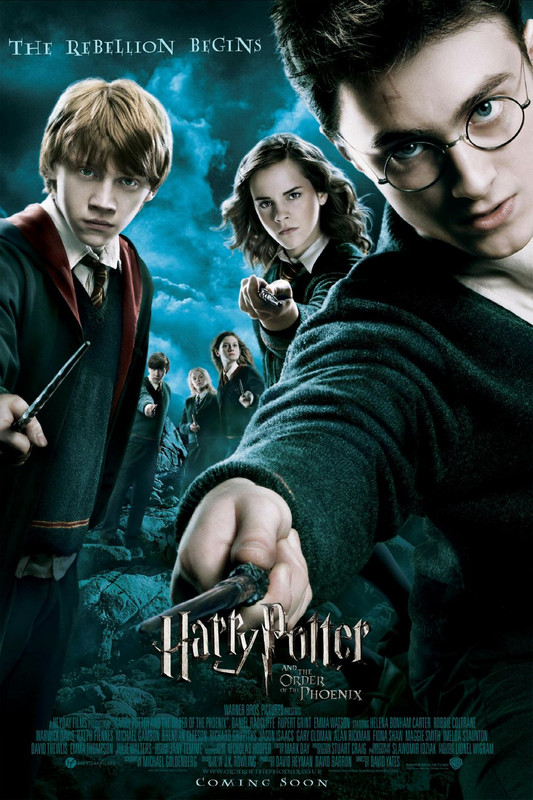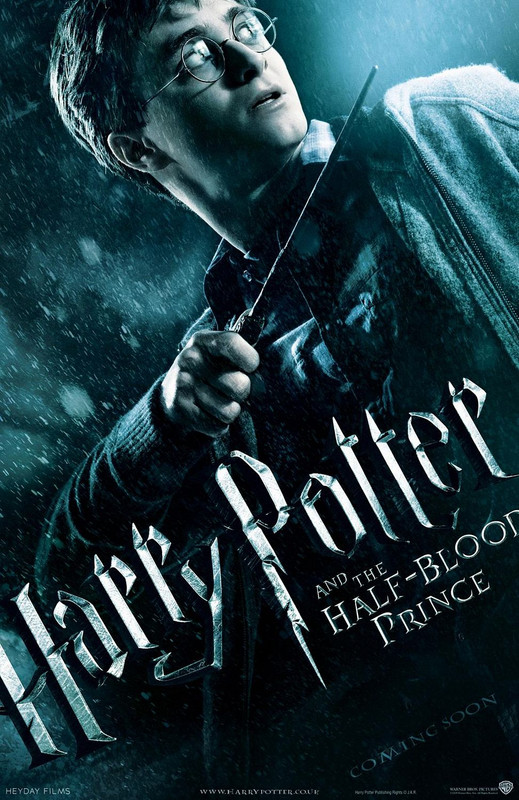For the second half of the franchise there has been just one director; David Yates, who came to Order of the Phoenix from acclaimed British TV series State of Play. It seemed an odd fit, but it was an inspired piece of directorial casting as the films moved into a new phase; the march to war.
Harry Potter And The Order Of The Phoenix [12]
Dir: David Yates
After the less focused and somewhat underwhelming Goblet of Fire, another new face came in behind the camera for the series fifth film; adapted from JK Rowling's longest book, new screenwriter Michael Goldenberg (in his only outing in the series, the rest all having been scripted by Steve Kloves) stripped the text back into the shortest, leanest and most focused film to date. Here, just halfway through the series, the march to war truly begins, and it does so in fine style.
Goblet of Fire never visited Privet Drive, but Harry's nightmarish Uncle (Richard Griffiths), Aunt (Fiona Shaw) and cousin make a reappearance for this film's opening sequence. The film begins on a glorious summer day, quite at odds with the visuals of the last two films, but soon, Dementors arrive, and director David Yates immediately shrouds even the muggle world in darkness. Yates retains the dark tone of the past two films, but brings his own vision to it (along with cinematographer Slawomir Idziak), giving the film a steely blue tint, which sets the tone of the world, and particularly of the scenes of Harry and his friends preparing for war, against the film's major new character.
Imelda Staunton's delightful turn as Dolores Umbrage gives the film a new kind of villain; a sweet looking middle aged woman who turns out to be a petty, dictatorial and cruel figure who wants to hide what is coming from the Hogwarts students to 'protect' them. This is, obviously, JK Rowling taking on education policy, but the film makes that undertone less prevalent and less irksome than Goblet of Fire did the 'satire' of the Rita Skeeter character. Staunton is hilarious in the role, but also frightening, portraying a butter wouldn't melt façade (complete with tinkling laugh), which becomes chilling when she is crossed (see the excellent scene in which she makes Harry do lines with a special quill designed to etch the words - painfully - on his skin).
Aside from Umbrage's bureaucratic and restrictive attitude at Hogwarts the film's main focus falls on Harry's attempts to do what she won't allow, teach a practical Defence Against the Dark Arts course, raising an army of students (which includes delightful new addition Luna Lovegood, played by Evanna Lynch) to fight Voldemort when the time comes. These sequences are fantastic, the film moves quickly through the training, dealing with much of it in a couple of montages, but it takes enough time that we still get character beats, Umbrage's attempts to discover the secret class, and a real sense of the progress being made. It's adaptation working at its best, reducing something that should take a long time down to its essence without losing the storytelling.
The film's last act is exceptional; a large scale set piece taking place inside the Department of Mysteries at the Ministry of Magic, with Harry and his small army (Ron and Hermione along with Luna, Ginny (Bonnie Wright, continuing to make a tiny part resonate) and Neville (Matthew Lewis, convincingly gaining in strength with each film)) facing off with a group of death eaters which now includes an unhinged Helena Bonham Carter as Azkaban escapee Bellatrix Lestrange. The battle is brutal, with a moment when Lucius Malfoy punches Luna in the face, making her bleed, and Ginny's hugely effective 'Reducta' being especially memorable for the way they raise the level of violence from previous entries. In the pitched battle the spells that fly back and forth begin to feel like bullets, and Yates directs the sequence like a gunfight, which pays dividends when an important character is hit and killed.
You would expect, by the fifth film, for the returning actors to be settling into their roles, and so it proves. The leads have always had an easy chemistry, but it's really felt in this film; the group more close knit than ever. In a lovely moment Harry, Ron and Hermione are talking about feelings, and Hermione says that Ron has 'the emotional range of a teaspoon', the reaction, the slowly dawning laughter that spreads through their little gang here, really speaks to their closeness as well as any other character beat in the series. Daniel Radcliffe, in particular, has a lot more asked of him this time out, and he delivers. When the film's tragic loss comes his reaction is really powerful, as is the way he defeats Voldemort, who has possessed him for a moment. David Yates was hired for his work with actors, and it seems to have paid great dividends. The adults also deliver, with Helena Bonham Carter making for a memorable (if slightly underused) villain, Gary Oldman bringing both warmth and force as Sirius Black and the ever entertaining Alan Rickman again giving it his best English Christopher Walken as Snape.
Order of the Phoenix is a tight, well disciplined, frequently thrilling film, and for my money its one of the best of the Harry Potter series.
★★★★★
Harry Potter And The Half Blood Prince [12]
Dir: David Yates
Despite a two and a half hour running time, the sixth Harry Potter film doesn't stand still for very long. Right from the off director David Yates' second crack at the Potter whip throws us into events, making no concessions to latecomers (which is as it should be, by this point you're either on board or you're not). He leads off with one of the film's most striking setpieces, the Muggle world finally seeing what's happening in the magic world as Death Eaters blast through Muggle London before arriving in Diagon Alley.
Yates and screenwriter Steve Kloves maintain a loose, but effective, grip when it comes to storytelling, with much that could have required the sort of florid explanations common to the first few films actually told in a few images that at first seem incidental but which ultimately add up to something much greater than the sum of those elliptical parts (the best use of this is in Draco Malfoy's story, which seems, for a long time, to consist of shots of him opening and closing a cupboard). The only place where the storytelling falls down this time is really in regard of the title, as the Half Blood Prince (the previous owner of a potions book that Harry uses to become top of new professor Horace Slughorn's class) only reveals his identity late in the day, and when he does the revelation falls flat, because it doesn't seem to mean anything.
Harry Potter and the Growing Pains might be a more suitable title for this film, as while it builds up the ongoing Voldemort storyline very capably, and has many fine action sequences, much of the running time is given over to the changing relationships between the characters. These are some of the film's most effective and affecting moments, especially when both Harry and Hermione are unable to take the person they want to go with to a party thrown by Slughorn (Ron in Hermione's case, Ginny in Harry's), this leads to a beautifully played scene between Emma Watson and Daniel Radcliffe in which Hermione in particular seems more vulnerable than ever before. It's great that, even as war creeps ever closer, the films still take time to have these beats, because the investment they give you in the characters gives the encroaching threat more weight, because you care what happens to these people. There's also a nice smattering of comedy in this part of the film, supplied, as ever, largely by Rupert Grint, though Evanna Lynch gets to be adorably weird once more as Luna Lovegood (if you aren't charmed when she randomly pops up in a Lion costume then you're not human), and even Radcliffe gets in on the act when Harry takes a potion called liquid luck.
On the other side of the coin the film uses the new character of Horace Slughorn (an entertainingly scatty Jim Broadbent) to introduce memories of a young Voldemort, and lay the groundwork of plot for the next two films. The full horror of Voldemort's evil, and the difficulty of the task lying in front of Harry, Hermione and Ron becomes clear in this instalment as we are introduced to the concept of a Horcrux; a device holding part of a person's soul, which enables them to live even if their body is destroyed. This ushers in a whole new sense of threat, which is given weight both by the ever darkening visual style and by the much more brutal tone to the film. A fight between Harry and Draco Malfoy (Tom Felton, finally starting to come to grips with the whole 'acting' thing, but still very much the weak link in the cast) feels extremely personal, and the violence coming from Harry speaks clearly of how much he's changed since Philosopher's Stone.
The only real chink of light in Half Blood Prince is Harry's relationship with Ginny Weasly. It's nice to see Bonnie Wright; a serene background presence in each film, come into her own here, giving Ginny great strength and resolve. She and Radcliffe have a nice chemistry together, and Harry and Ginny's first kiss has a sweetness and an innocence which works well for the relationship that has really been bubbling under since Chamber of Secrets.
It's hard to know what to say about the cast and crew at this point; everyone continues to raise their game. Radcliffe's performance as Harry has acquired a moral complexity which is incredibly compelling, but remains a real (in all senses of the word) hero. Rupert Grint continues to give us a bit of comic relief, but is also able to bring some dramatic weight when Ron is called upon to help his friends, while, as I mentioned above, there is an emotional depth to Emma Watson's performance here that we haven't really seen before, and she makes Hermione feel much more human by showing us her vulnerable side. The film also looks exceptional, Yates seems to have grown in confidence, making more unusual shot choices (look at the opening frames) and the special effects are little short of miraculous. There's really not much to criticise.
There is a lot of plot to get through in this episode of the Harry Potter series, but as ever the cast and crew do it with assurance, and they make sure that even at the heaviest expository moments the film is never dull. The set pieces are stunning, especially a mid film moment in which the Weasly house is attacked by Death Eaters (not in the book), and though the battle that ends the book has been deleted (for fear it would prove to similar to the battle that forms the second half of the final film), Yates and Kloves manage to find final moments that send a shiver up the spine and bring a tear to the eye, and make you desperate to see, finally, how it all ends.
★★★★★



I'm looking forward to your review of Part 2!
ReplyDelete